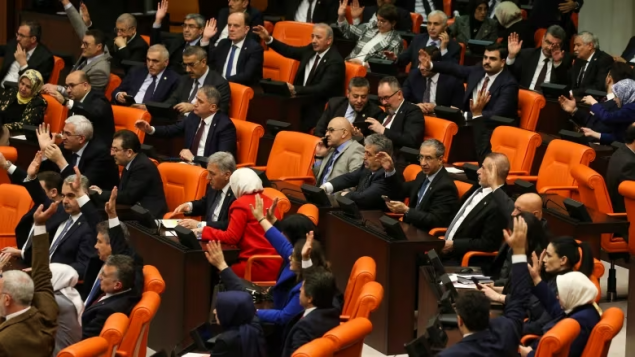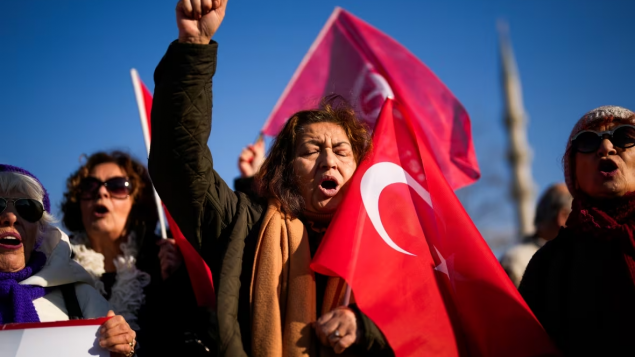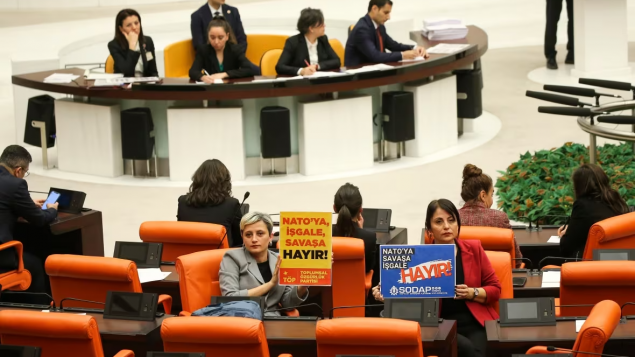Turkey’s parliament approves Sweden’s membership in NATO

Decision lifts major hurdle to Sweden’s entry into the military alliance
Turkey’s parliament on Tuesday approved Sweden’s membership in NATO, lifting a major hurdle to the previously non-aligned country’s entry into the military alliance.
The legislators ratified Sweden’s accession protocol by 287 votes to 55, with four abstentions.
Turkish President Recep Tayyip Erdogan’s ruling AK Party, its Nationalist Movement Party allies and the main opposition Republican People’s Party all voted in favour of the bid in the general assembly. Opposition nationalist, Islamist and leftist parties voted against it.
Erdogan will likely sign the bill into law in the coming days, thus ending a lengthy process that has both frustrated some of Turkey’s Western allies and enabled it to extract concessions.
“Today we are one step closer to becoming a full member of NATO,” Swedish Prime Minister Ulf Kristersson wrote on X, formerly known as Twitter.
The U.S. ambassador to Turkey, Jeff Flake, also welcomed the Turkish parliament’s decision, calling it a “great move” for Sweden, Turkey and NATO.

NATO chief Jens Stoltenberg also welcomed the Turkish parliament’s decision to ratify Sweden’s NATO membership bid.
“All NATO allies agreed [at the summit] in Vilnius to invite Sweden to join our alliance, and Sweden has fulfilled its commitments,” he said in a statement Tuesday. “Sweden’s membership makes NATO stronger and all of us safer.”
Stoltenberg also called on Hungary to follow suit. Following Turkey’s approval, Hungary is now the only NATO ally not to have ratified Sweden’s accession.
A shift after concessions
NATO member Turkey had been delaying Sweden’s membership for more than a year, accusing the country of being too lenient toward groups it regards as security threats.
It has been seeking concessions from Stockholm, including a tougher stance toward Kurdish militants and members of a network Turkey blames for a failed coup in 2016.
Turkey had also been angered by a series of demonstrations by supporters of the outlawed Kurdistan Workers’ Party, or PKK, in Sweden, as well as Qur’an-burning protests that roiled Muslim countries.

Sweden in the past was a “centre in Europe” for the PKK, Fuat Oktay, a senior legislator in Erdogan’s governing party and head of the foreign affairs committee, told parliament.
But since then, Sweden has amended its anti-terrorism laws, curbed the PKK’s financial activities, convicted a terrorism suspect and extradited another, and lifted restrictions on arms sales to Turkey, Oktay said.
“PKK-affiliated circles no longer find a comfortable room for manoeuvre in Sweden as they did in the past,” said Oktay, explaining why the ruling party was now supporting Stockholm’s bid.
Last month, the Turkish parliament’s foreign affairs committee gave its consent to Sweden’s bid in the first stage of the legislative process, after the Turkish president sent its accession protocol to lawmakers for approval.
Turkey’s main opposition party also supported Sweden’s membership in the alliance, but a centre-right party and the country’s pro-Kurdish party declared they would oppose it.
“Sweden’s steps concerning its extradition of wanted criminals or the fight against terrorism have remained limited and insufficient,” Musavat Dervisoglu, a legislator from the Good Party, told parliament.
Erdogan has linked ratification of Sweden’s NATO membership to the U.S. Congress’ approval of a Turkish request to purchase 40 new F-16 fighter jets and kits to modernize Turkey’s existing fleet. He has also urged Canada and other NATO allies to lift arms embargoes on Turkey.
Koray Aydin, another Good Party legislator, had urged parliament to hold out on ratifying Sweden’s accession until the F-16 sales and the modernization kits were approved in Washington, saying Turkey would lose an important bargaining chip.

U.S. President Joe Biden’s administration never formally tied the sale of the F-16s to Turkey’s ratification of Sweden’s NATO membership. However, numerous influential members of Congress had said they would not support the sale unless — and until — Turkey signed off on Sweden’s accession to the alliance.
U.S. administration officials say they expect relatively quick action on the F-16 sale after the ratification.
Eyes turn to Hungary
Sweden and Finland abandoned their traditional positions of military non-alignment to seek protection under NATO’s security umbrella following Russia’s invasion of Ukraine in February 2022. Finland joined the alliance in April, becoming NATO’s 31st member, after Turkey’s parliament ratified the Nordic country’s bid.
NATO requires the unanimous approval of all existing members to expand, and Turkey and Hungary were the only countries that have been holding out, frustrating other NATO allies who had been pressing for Sweden and Finland’s swift accession.
Hungary alleges that Swedish politicians have told “blatant lies” about the condition of Hungary’s democracy. Hungary has said it would not be the last to approve accession, although it was not clear when the Hungarian parliament intends to hold a vote.
Nevertheless, Hungarian Prime Minister Viktor Orbán announced Tuesday that he sent a letter to Kristersson, inviting him to Budapest to discuss Sweden’s entry into NATO.
With files from Reuters
Related stories from around the North:
Canada: U.S. report claims Trudeau told NATO Canada will never meet military spending target, CBC News
Denmark: Denmark promises increased focus on Arctic as it takes over NORDEFCO chair, Eye on the Arctic
Iceland: Norwegian F-35s in Iceland for airspace surveillance, Eye on the Arctic
Norway: British troops deploy to northern Norway ahead of huge NATO Arctic exercise, The Independent Barents Observer
Russia: Putin beefs up naval nuclear arsenal, promises more subs, The Independent Barents Observer
Sweden: Swedes must mentally prepare for war, says military top brass, Radio Sweden
United Kingdom: UK urged to bolster Arctic defense as grey-zone threats rise: report, Eye on the Arctic
United States: First U.S. deep water port for the Arctic to host cruise ships, military, The Associated Press



